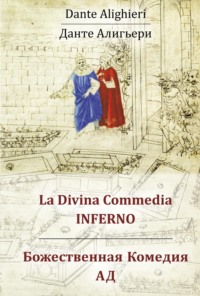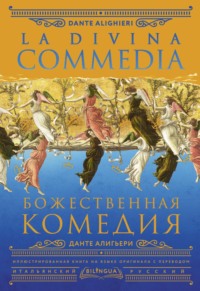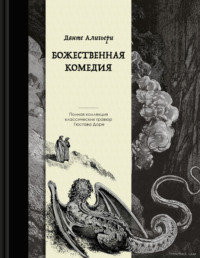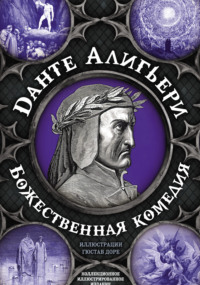
Полная версия
Inferno
Necessity makes her precipitate,
So often cometh who his turn obtains.
And this is she who is so crucified
Even by those who ought to give her praise,
Giving her blame amiss, and bad repute.
But she is blissful, and she hears it not;
Among the other primal creatures gladsome
She turns her sphere, and blissful she rejoices.
Let us descend now unto greater woe;
Already sinks each star that was ascending
When I set out, and loitering is forbidden.”
We crossed the circle to the other bank,
Near to a fount that boils, and pours itself
Along a gully that runs out of it.
The water was more sombre far than perse;
And we, in company with the dusky waves,
Made entrance downward by a path uncouth.
A marsh it makes, which has the name of Styx,
This tristful brooklet, when it has descended
Down to the foot of the malign gray shores.
And I, who stood intent upon beholding,
Saw people mud-besprent in that lagoon,
All of them naked and with angry look.
They smote each other not alone with hands,
But with the head and with the breast and feet,
Tearing each other piecemeal with their teeth.
Said the good Master: “Son, thou now beholdest
The souls of those whom anger overcame;
And likewise I would have thee know for certain
Beneath the water people are who sigh
And make this water bubble at the surface,
As the eye tells thee wheresoe’er it turns.
Fixed in the mire they say, ‘We sullen were
In the sweet air, which by the sun is gladdened,
Bearing within ourselves the sluggish reek;
Now we are sullen in this sable mire.’
This hymn do they keep gurgling in their throats,
For with unbroken words they cannot say it.”
Thus we went circling round the filthy fen
A great arc ’twixt the dry bank and the swamp,
With eyes turned unto those who gorge the mire;
Unto the foot of a tower we came at last.
CANTO VIII
I say, continuing, that long before
We to the foot of that high tower had come,
Our eyes went upward to the summit of it,
By reason of two flamelets we saw placed there,
And from afar another answer them,
So far, that hardly could the eye attain it.
And, to the sea of all discernment turned,
I said: “What sayeth this, and what respondeth
That other fire? and who are they that made it?”
And he to me: “Across the turbid waves
What is expected thou canst now discern,
If reek of the morass conceal it not.”
Cord never shot an arrow from itself
That sped away athwart the air so swift,
As I beheld a very little boat
Come o’er the water tow’rds us at that moment,
Under the guidance of a single pilot,
Who shouted, “Now art thou arrived, fell soul?”
“Phlegyas, Phlegyas, thou criest out in vain
For this once,” said my Lord; “thou shalt not have us
Longer than in the passing of the slough.”
As he who listens to some great deceit
That has been done to him, and then resents it,
Such became Phlegyas, in his gathered wrath.
My Guide descended down into the boat,
And then he made me enter after him,
And only when I entered seemed it laden.
Soon as the Guide and I were in the boat,
The antique prow goes on its way, dividing
More of the water than ’tis wont with others.
While we were running through the dead canal,
Uprose in front of me one full of mire,
And said, “Who ’rt thou that comest ere the hour?”
And I to him: “Although I come, I stay not;
But who art thou that hast become so squalid?”
“Thou seest that I am one who weeps,” he answered.
And I to him: “With weeping and with wailing,
Thou spirit maledict, do thou remain;
For thee I know, though thou art all defiled.”
Then stretched he both his hands unto the boat;
Whereat my wary Master thrust him back,
Saying, “Away there with the other dogs!”
Thereafter with his arms he clasped my neck;
He kissed my face, and said: “Disdainful soul,
Blessed be she who bore thee in her bosom.
That was an arrogant person in the world;
Goodness is none, that decks his memory;
So likewise here his shade is furious.
How many are esteemed great kings up there,
Who here shall be like unto swine in mire,
Leaving behind them horrible dispraises!”
And I: “My Master, much should I be pleased,
If I could see him soused into this broth,
Before we issue forth out of the lake.”
And he to me: “Ere unto thee the shore
Reveal itself, thou shalt be satisfied;
Such a desire ’tis meet thou shouldst enjoy.”
A little after that, I saw such havoc
Made of him by the people of the mire,
That still I praise and thank my God for it.
They all were shouting, “At Philippo Argenti!”
And that exasperate spirit Florentine
Turned round upon himself with his own teeth.
We left him there, and more of him I tell not;
But on mine ears there smote a lamentation,
Whence forward I intent unbar mine eyes.
And the good Master said: “Even now, my Son,
The city draweth near whose name is Dis,
With the grave citizens, with the great throng.”
And I: “Its mosques already, Master, clearly
Within there in the valley
I discern Vermilion, as if issuing from the fire
They were.” And he to me: “The fire eternal
That kindles them within makes them look red,
As thou beholdest in this nether Hell.”
Then we arrived within the moats profound,
That circumvallate that disconsolate city;
The walls appeared to me to be of iron.
Not without making first a circuit wide,
We came unto a place where loud the pilot
Cried out to us, “Debark, here is the entrance.”
More than a thousand at the gates I saw
Out of the Heavens rained down, who angrily
Were saying, “Who is this that without death
Goes through the kingdom of the people dead?”
And my sagacious Master made a sign
Of wishing secretly to speak with them.
A little then they quelled their great disdain,
And said: “Come thou alone, and he begone
Who has so boldly entered these dominions.
Let him return alone by his mad road;
Try, if he can; for thou shalt here remain,
Who hast escorted him through such dark regions.”
Think, Reader, if I was discomforted
At utterance of the accursed words;
For never to return here I believed.
“O my dear Guide, who more than seven times
Hast rendered me security, and drawn me
From imminent peril that before me stood,
Do not desert me,” said I, “thus undone;
And if the going farther be denied us,
Let us retrace our steps together swiftly.”
And that Lord, who had led me thitherward,
Said unto me: “Fear not; because our passage
None can take from us, it by Such is given.
But here await me, and thy weary spirit
Comfort and nourish with a better hope;
For in this nether world I will not leave thee.”
So onward goes and there abandons me
My Father sweet, and I remain in doubt,
For No and Yes within my head contend.
I could not hear what he proposed to them;
But with them there he did not linger long,
Ere each within in rivalry ran back.
They closed the portals, those our adversaries,
On my Lord’s breast, who had remained without
And turned to me with footsteps far between.
His eyes cast down, his forehead shorn had he
Of all its boldness, and he said, with sighs,
“Who has denied to me the dolesome houses?”
And unto me: “Thou, because I am angry,
Fear not, for I will conquer in the trial,
Whatever for defence within be planned.
This arrogance of theirs is nothing new;
For once they used it at less secret gate,
Which finds itself without a fastening still.
O’er it didst thou behold the dead inscription;
And now this side of it descends the steep,
Passing across the circles without escort,
One by whose means the city shall be opened.”
CANTO IX
That hue which cowardice brought out on me,
Beholding my Conductor backward turn,
Sooner repressed within him his new colour.
He stopped attentive, like a man who listens,
Because the eye could not conduct him far
Through the black air, and through the heavy fog.
“Still it behoveth us to win the fight,”
Began he; “Else … Such offered us herself …
O how I long that some one here arrive!”
Well I perceived, as soon as the beginning
He covered up with what came afterward,
That they were words quite different from the first;
But none the less his saying gave me fear,
Because I carried out the broken phrase,
Perhaps to a worse meaning than he had.
“Into this bottom of the doleful conch
Doth any e’er descend from the first grade,
Which for its pain has only hope cut off?”
This question put I; and he answered me:
“Seldom it comes to pass that one of us
Maketh the journey upon which I go.
True is it, once before I here below
Was conjured by that pitiless Erictho,
Who summoned back the shades unto their bodies.
Naked of me short while the flesh had been,
Before within that wall she made me enter,
To bring a spirit from the circle of Judas;
That is the lowest region and the darkest,
And farthest from the heaven which circles all.
Well know I the way; therefore be reassured.
This fen, which a prodigious stench exhales,
Encompasses about the city dolent,
Where now we cannot enter without anger.”
And more he said, but not in mind I have it;
Because mine eye had altogether drawn me
Tow’rds the high tower with the red-flaming summit,
Where in a moment saw I swift uprisen
The three infernal Furies stained with blood,
Who had the limbs of women and their mien,
And with the greenest hydras were begirt;
Small serpents and cerastes were their tresses,
Wherewith their horrid temples were entwined.
And he who well the handmaids of the Queen
Of everlasting lamentation knew,
Said unto me: “Behold the fierce Erinnys.
This is Megaera, on the left-hand side;
She who is weeping on the right, Alecto;
Tisiphone is between;” and then was silent.
Each one her breast was rending with her nails;
They beat them with their palms, and cried so loud,
That I for dread pressed close unto the Poet.
“Medusa come, so we to stone will change him!”
All shouted looking down; “in evil hour
Avenged we not on Theseus his assault!”
“Turn thyself round, and keep thine eyes close shut,
For if the Gorgon appear, and thou shouldst see it,
No more returning upward would there be.”
Thus said the Master; and he turned me round
Himself, and trusted not unto my hands
So far as not to blind me with his own.
O ye who have undistempered intellects,
Observe the doctrine that conceals itself
Beneath the veil of the mysterious verses!
And now there came across the turbid waves
The clangour of a sound with terror fraught,
Because of which both of the margins trembled;
Not otherwise it was than of a wind
Impetuous on account of adverse heats,
That smites the forest, and, without restraint,
The branches rends, beats down, and bears away;
Right onward, laden with dust, it goes superb,
And puts to flight the wild beasts and the shepherds.
Mine eyes he loosed, and said: “Direct the nerve
Of vision now along that ancient foam,
There yonder where that smoke is most intense.”
Even as the frogs before the hostile serpent
Across the water scatter all abroad,
Until each one is huddled in the earth.
More than a thousand ruined souls I saw,
Thus fleeing from before one who on foot
Was passing o’er the Styx with soles unwet.
From off his face he fanned that unctuous air,
Waving his left hand oft in front of him,
And only with that anguish seemed he weary.
Well I perceived one sent from Heaven was he,
And to the Master turned; and he made sign
That I should quiet stand, and bow before him.
Ah! how disdainful he appeared to me!
He reached the gate, and with a little rod
He opened it, for there was no resistance.
“O banished out of Heaven, people despised!”
Thus he began upon the horrid threshold;
“Whence is this arrogance within you couched?
Wherefore recalcitrate against that will,
From which the end can never be cut off,
And which has many times increased your pain?
What helpeth it to butt against the fates?
Your Cerberus, if you remember well,
For that still bears his chin and gullet peeled.”
Then he returned along the miry road,
And spake no word to us, but had the look
Of one whom other care constrains and goads
Than that of him who in his presence is;
And we our feet directed tow’rds the city,
After those holy words all confident.
Within we entered without any contest;
And I, who inclination had to see
What the condition such a fortress holds,
Soon as I was within, cast round mine eye,
And see on every hand an ample plain,
Full of distress and torment terrible.
Even as at Arles, where stagnant grows the Rhone,
Even as at Pola near to the Quarnaro,
That shuts in Italy and bathes its borders,
The sepulchres make all the place uneven;
So likewise did they there on every side,
Saving that there the manner was more bitter;
For flames between the sepulchres were scattered,
By which they so intensely heated were,
That iron more so asks not any art.
All of their coverings uplifted were,
And from them issued forth such dire laments,
Sooth seemed they of the wretched and tormented.
And I: “My Master, what are all those people
Who, having sepulture within those tombs,
Make themselves audible by doleful sighs?”
And he to me: “Here are the Heresiarchs,
With their disciples of all sects, and much
More than thou thinkest laden are the tombs.
Here like together with its like is buried;
And more and less the monuments are heated.”
And when he to the right had turned, we passed
Between the torments and high parapets.
CANTO X
Now onward goes, along a narrow path
Between the torments and the city wall,
My Master, and I follow at his back.
“O power supreme, that through these impious circles
Turnest me,” I began, “as pleases thee,
Speak to me, and my longings satisfy;
The people who are lying in these tombs,
Might they be seen? already are uplifted
The covers all, and no one keepeth guard.”
And he to me: “They all will be closed up
When from Jehoshaphat they shall return
Here with the bodies they have left above.
Their cemetery have upon this side
With Epicurus all his followers,
Who with the body mortal make the soul;
But in the question thou dost put to me,
Within here shalt thou soon be satisfied,
And likewise in the wish thou keepest silent.”
And I: “Good Leader, I but keep concealed
From thee my heart, that I may speak the less,
Nor only now hast thou thereto disposed me.”
“O Tuscan, thou who through the city of fire
Goest alive, thus speaking modestly,
Be pleased to stay thy footsteps in this place.
Thy mode of speaking makes thee manifest
A native of that noble fatherland,
To which perhaps I too molestful was.”
Upon a sudden issued forth this sound
From out one of the tombs; wherefore I pressed,
Fearing, a little nearer to my Leader.
And unto me he said: “Turn thee; what dost thou?
Behold there Farinata who has risen;
From the waist upwards wholly shalt thou see him.”
I had already fixed mine eyes on his,
And he uprose erect with breast and front
E’en as if Hell he had in great despite.
And with courageous hands and prompt my Leader
Thrust me between the sepulchres towards him,
Exclaiming, “Let thy words explicit be.”
As soon as I was at the foot of his tomb
Somewhat he eyed me, and, as if disdainful,
Then asked of me, “Who were thine ancestors?”
I, who desirous of obeying was,
Concealed it not, but all revealed to him;
Whereat he raised his brows a little upward.
Then said he: “Fiercely adverse have they been
To me, and to my fathers, and my party;
So that two several times I scattered them.”
“If they were banished, they returned on all sides,”
I answered him, “the first time and the second;
But yours have not acquired that art aright.”
Then there uprose upon the sight, uncovered
Down to the chin, a shadow at his side;
I think that he had risen on his knees.
Round me he gazed, as if solicitude
He had to see if some one else were with me,
But after his suspicion was all spent,
Weeping, he said to me: “If through this blind
Prison thou goest by loftiness of genius,
Where is my son? and why is he not with thee?”
And I to him: “I come not of myself;
He who is waiting yonder leads me here,
Whom in disdain perhaps your Guido had.”
His language and the mode of punishment
Already unto me had read his name;
On that account my answer was so full.
Up starting suddenly, he cried out: “How
Saidst thou,—he had? Is he not still alive?
Does not the sweet light strike upon his eyes?”
When he became aware of some delay,
Which I before my answer made, supine
He fell again, and forth appeared no more.
But the other, magnanimous, at whose desire
I had remained, did not his aspect change,
Neither his neck he moved, nor bent his side.
“And if,” continuing his first discourse,
“They have that art,” he said, “not learned aright,
That more tormenteth me, than doth this bed.
But fifty times shall not rekindled be
The countenance of the Lady who reigns here,
Ere thou shalt know how heavy is that art;
And as thou wouldst to the sweet world return,
Say why that people is so pitiless
Against my race in each one of its laws?”
Whence I to him: “The slaughter and great carnage
Which have with crimson stained the Arbia, cause
Such orisons in our temple to be made.”
After his head he with a sigh had shaken,
“There I was not alone,” he said, “nor surely
Without a cause had with the others moved.
But there I was alone, where every one
Consented to the laying waste of Florence,
He who defended her with open face.”
“Ah! so hereafter may your seed repose,”
I him entreated, “solve for me that knot,
Which has entangled my conceptions here.
It seems that you can see, if I hear rightly,
Beforehand whatsoe’er time brings with it,
And in the present have another mode.”
“We see, like those who have imperfect sight,
The things,” he said, “that distant are from us;
So much still shines on us the Sovereign Ruler.
When they draw near, or are, is wholly vain
Our intellect, and if none brings it to us,
Not anything know we of your human state.
Hence thou canst understand, that wholly dead
Will be our knowledge from the moment when
The portal of the future shall be closed.”
Then I, as if compunctious for my fault,
Said: “Now, then, you will tell that fallen one,
That still his son is with the living joined.
And if just now, in answering, I was dumb,
Tell him I did it because I was thinking
Already of the error you have solved me.”
And now my Master was recalling me,
Wherefore more eagerly I prayed the spirit
That he would tell me who was with him there.
He said: “With more than a thousand here I lie;
Within here is the second Frederick,
And the Cardinal, and of the rest I speak not.”
Thereon he hid himself; and I towards
The ancient poet turned my steps, reflecting
Upon that saying, which seemed hostile to me.
He moved along; and afterward thus going,
He said to me, “Why art thou so bewildered?”
And I in his inquiry satisfied him.
“Let memory preserve what thou hast heard
Against thyself,” that Sage commanded me,
“And now attend here;” and he raised his finger.
“When thou shalt be before the radiance sweet
Of her whose beauteous eyes all things behold,
From her thou’lt know the journey of thy life.”
Unto the left hand then he turned his feet;
We left the wall, and went towards the middle,
Along a path that strikes into a valley,
Which even up there unpleasant made its stench.
CANTO XI
Upon the margin of a lofty bank
Which great rocks broken in a circle made,
We came upon a still more cruel throng;
And there, by reason of the horrible
Excess of stench the deep abyss throws out,
We drew ourselves aside behind the cover
Of a great tomb, whereon I saw a writing,
Which said: “Pope Anastasius I hold,
Whom out of the right way Photinus drew.”
“Slow it behoveth our descent to be,
So that the sense be first a little used
To the sad blast, and then we shall not heed it.”
The Master thus; and unto him I said,
“Some compensation find, that the time pass not
Idly;” and he: “Thou seest I think of that.
My son, upon the inside of these rocks,”
Began he then to say, “are three small circles,
From grade to grade, like those which thou art leaving.
They all are full of spirits maledict;
But that hereafter sight alone suffice thee,
Hear how and wherefore they are in constraint.
Of every malice that wins hate in Heaven,
Injury is the end; and all such end
Either by force or fraud afflicteth others.
But because fraud is man’s peculiar vice,
More it displeases God; and so stand lowest
The fraudulent, and greater dole assails them.











